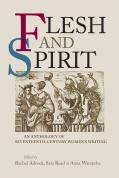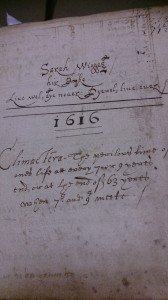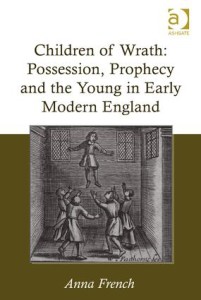
This week’s post is a quick look at the anthology Flesh and Spirit: An Anthology of Seventeenth-century Women’s Writing
August saw the first anniversary of the publication of Flesh and Spirit: An Anthology of Seventeenth-century Women’s Writing (Manchester University Press, 2014) co-edited by Sara, with Rachel Adcock (Keele) and Anna Ziomek. Since we didn’t have a moment to celebrate its launch on the blog (we were too busy at the conference ‘Early Modern Women, Religion and the Body’ at Loughborough University where the book was launched in the flesh), we thought is was about time we did so! As the title of the anthology indicates, the book anthologises women’s writings about their bodily and spiritual health and well-being.

As discussed in an earlier post, Sarah Wigges noted in her commonplace book in 1616, the widely accepted truism that one should strive to
Live Wel, dye never; Dye wel, live ever.’

Or in other words if one lived a good healthy and pious life one would be rewarded with eternal life. Dying well too was a Christian ideal as in the process of dying a suffer could demonstrate their submission to God’s will. One of the texts in the anthology is an anonymous one by ‘A Gentlewoman’, and it is the story of her conversion which she dictated on her deathbed to her husband and which he subsequently had printed as an example to others. Prayers and physical cures for illnesses were used as a duel approach to getting well just as was seen in the post about spas we published in April.
The publisher’s website describes how:
Overall, the anthology makes accessible to readers ten little-known and under-studied works by seventeenth-century women (edited from manuscript and print) that explore the relationship between spiritual and physical health in the period. Providing a detailed and engaging introduction to the issues confronted when studying women’s writing from this era, the anthology also examines female interpretations of illness, exploring beliefs that toothache and miscarriage could be God’s punishments, but also, paradoxically, that such terrible suffering could be understood as proof that a believer was eternally beloved.
The extracts in the anthology explore how illness was an important part of women’s religious conversion, often confirming religious belief, but also how women could advise others about their physical and spiritual health in manuscript and print. The anthology includes a thorough introduction to the period’s medical and religious beliefs, as well as an introduction to contemporary ideas about women’s physical and spiritual make up. Each of the ten extracts also has its own preface, highlighting relevant contexts and further reading, and is fully annotated.
The anthology has a full 12,000 word introduction which is split into sections contextualising:. The dialogue between flesh and spirit; ideas about sin and childbirth; the religious and political context; conversion and cures; and the culture of women offering health advice. Authors anthologised include Elizabeth Clinton, Countess of Lincoln, Lady Mary Carey, Elizabeth Major, Gertrude More, Brilliana, Lady Harley, ‘Eliza’, Lady Elizabeth Delaval, Hannah Allen, and Katherine Sutton.
The edition is primarily designed for teaching, but the editors hope that the anthology will be of interest to scholars of early modern women’s writing, women’s history, the body and health, and religion – and of course the connection between them all.
Enjoy!



One thought on “Flesh and Spirit”
Comments are closed.